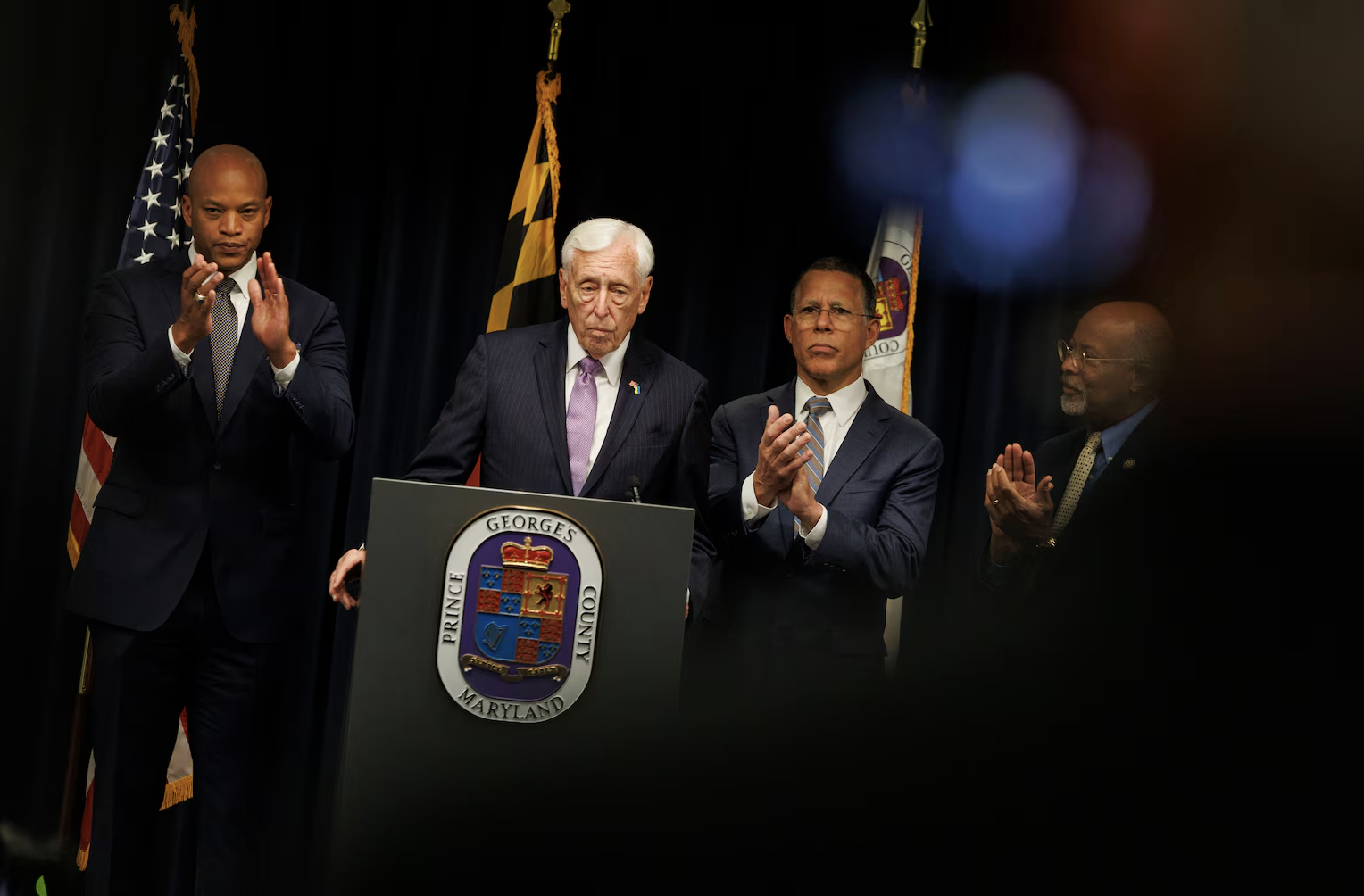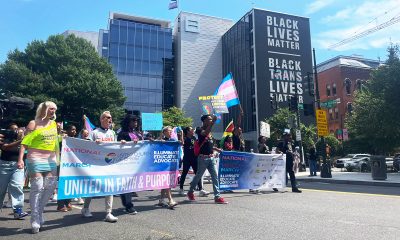Local
Judge rejects request for stay on D.C. marriage law
A D.C. Superior Court judge Friday denied a Maryland minister’s request for a temporary injunction to prevent the city’s same-sex marriage law from taking effect March 3.
Following a hearing, Judge Brian Holeman issued a preliminary ruling from the bench saying he did not have authority to block a law approved by the city government and cleared by Congress through the normal congressional review process.
Holeman also said he didn’t believe a lawsuit filed by Bishop Harry Jackson seeking to force the city to hold a voter referendum to overturn the marriage law was likely to succeed on the merits. Holeman noted that a key requirement for a court injunction is that the people seeking it can demonstrate a likelihood of winning an underlying case.
“Everyone knows the chances of their winning on the merits are very slim,” said gay rights attorney Mark Levine, who attended the court hearing.
Jackson filed the lawsuit earlier this year after the city’s election board rejected his proposed referendum on grounds that it would violate the D.C. Human Rights Act, which bans discrimination based on sexual orientation.
In Friday’s hearing, Holeman told attorneys for Jackson and for the city, who argued against the injunction, that he would issue a final, written decision on the injunction request Monday.
“I understood this to mean that his written opinion would be the same as his ruling today — to deny the injunction,” Levine said.
He said Jackson’s lawyers indicated they would quickly take their request for an injunction to the D.C. Court of Appeals, possibly as soon as Friday afternoon or Monday. He noted that most court observers believe the appeals court will uphold Holeman’s ruling against an injunction to block the marriage law.
Holeman denied yet another request by Austin Nimocks, one of Jackson’s attorneys, asking him to rule Friday on both the injunction request and on the merits of the case. Instead, Holeman scheduled a separate hearing on the merits of Jackson’s case seeking a voter referendum for Friday, Feb. 27.
“It’s a hearing I think is very likely to be cancelled,” said Levine.
He was referring to the rapidly approaching deadline that Jackson and his supporters face to pull together the numerous requirements of a voter referendum, including petition signatures from voters across the city.
Under the city’s election law, these requirements must be met between the time the D.C. government passes a law that opponents seek to kill through a referendum and the time Congress completes its 30 legislative day review of such a law. Congress is expected to complete its review on the same-sex marriage measure March 3.
Legal observers have said Jackson has a better — although unlikely — chance of killing the marriage law through a separate process he began earlier this year for a voter initiative. Unlike a referendum, the city’s election law gives up to six months for completing the necessary petition and administrative requirements of placing an initiative on the ballot. However, there is no time limit for Jackson to continue his court appeal seeking to overturn the city and the lower court rulings disqualifying the marriage initiative on grounds that it violates the city’s human rights law.
Similar to their decision on Jackson’s referendum proposal, the D.C. Board of Elections & Ethics and a Superior Court judge have ruled that an initiative seeking to ban same-sex marriage cannot be held because it would violate the city’s Human Rights Act.
Jackson has appealed the board and a Superior Court judge’s rulings disqualifying his initiative proposal to the D.C. Court of Appeals. That court is expected to issue a ruling on the case later this year — after the same-sex marriage law has gone into effect and after gay and lesbian couples beginning marrying.
Nimocks and other attorneys working on Jackson case could not immediately be reached.
Virginia
Gay Va. State Sen. Ebbin resigns for role in Spanberger administration
Veteran lawmaker will step down in February

Alexandria Democrat Adam Ebbin, who has served as an openly gay member of the Virginia Legislature since 2004, announced on Jan. 7 that he is resigning from his seat in the State Senate to take a job in the administration of Gov.-Elect Abigail Spanberger.
Since 2012, Ebbin has been a member of the Virginia Senate for the 39th District representing parts of Alexandria, Arlington, and Fairfax counties. He served in the Virginia House of Delegates representing Alexandria from 2004 to 2012, becoming the state’s first out gay lawmaker.
His announcement says he submitted his resignation from his Senate position effective Feb. 18 to join the Spanberger administration as a senior adviser at the Virginia Cannabis Control Authority.
“I’m grateful to have the benefit of Senator Ebbin’s policy expertise continuing to serve the people of Virginia, and I look forward to working with him to prioritize public safety and public health,” Spanberger said in Ebbin’s announcement statement.
She was referring to the lead role Ebbin has played in the Virginia Legislature’s approval in 2020 of legislation decriminalizing marijuana and the subsequent approval in 2021of a bill legalizing recreational use and possession of marijuana for adults 21 years of age and older. But the Virginia Legislature has yet to pass legislation facilitating the retail sale of marijuana for recreational use and limits sales to purchases at licensed medical marijuana dispensaries.
“I share Governor-elect Spanberger’s goal that adults 21 and over who choose to use cannabis, and those who use it for medical treatment, have access to a well-tested, accurately labeled product, free from contamination,” Ebbin said in his statement. “2026 is the year we will move cannabis sales off the street corner and behind the age-verified counter,” he said.
Maryland
Steny Hoyer, the longest-serving House Democrat, to retire from Congress
Md. congressman served for years in party leadership

By ASSOCIATED PRESS and LISA MASCARO | Rep. Steny Hoyer of Maryland, the longest-serving Democrat in Congress and once a rival to become House speaker, will announce Thursday he is set to retire at the end of his term.
Hoyer, who served for years in party leadership and helped steer Democrats through some of their most significant legislative victories, is set to deliver a House floor speech about his decision, according to a person familiar with the situation and granted anonymity to discuss it.
“Tune in,” Hoyer said on social media. He confirmed his retirement plans in an interview with the Washington Post.
The rest of this article can be found on the Baltimore Banner’s website.
District of Columbia
Kennedy Center renaming triggers backlash
Artists who cancel shows threatened; calls for funding boycott grow

Efforts to rename the Kennedy Center to add President Trump’s name to the D.C. arts institution continue to spark backlash.
A new petition from Qommittee , a national network of drag artists and allies led by survivors of hate crimes, calls on Kennedy Center donors to suspend funding to the center until “artistic independence is restored, and to redirect support to banned or censored artists.”
“While Trump won’t back down, the donors who contribute nearly $100 million annually to the Kennedy Center can afford to take a stand,” the petition reads. “Money talks. When donors fund censorship, they don’t just harm one institution – they tell marginalized communities their stories don’t deserve to be told.”
The petition can be found here.
Meanwhile, a decision by several prominent musicians and jazz performers to cancel their shows at the recently renamed Trump-Kennedy Center in D.C. planned for Christmas Eve and New Year’s Eve has drawn the ire of the Center’s president, Richard Grenell.
Grenell, a gay supporter of President Donald Trump who served as U.S. ambassador to Germany during Trump’s first term as president, was named Kennedy Center president last year by its board of directors that had been appointed by Trump.
Last month the board voted to change the official name of the center from the John F. Kennedy Memorial Center For The Performing Arts to the Donald J. Trump And The John F. Kennedy Memorial Center For The Performing Arts. The revised name has been installed on the outside wall of the center’s building but is not official because any name change would require congressional action.
According to a report by the New York Times, Grenell informed jazz musician Chuck Redd, who cancelled a 2025 Christmas Eve concert that he has hosted at the Kennedy Center for nearly 20 years in response to the name change, that Grenell planned to arrange for the center to file a lawsuit against him for the cancellation.
“Your decision to withdraw at the last moment — explicitly in response to the Center’s recent renaming, which honors President Trump’s extraordinary efforts to save this national treasure — is classic intolerance and very costly to a non-profit arts institution,” the Times quoted Grenell as saying in a letter to Redd.
“This is your official notice that we will seek $1 million in damages from you for this political stunt,” the Times quoted Grenell’s letter as saying.
A spokesperson for the Trump-Kennedy Center did not immediately respond to an inquiry from the Washington Blade asking if the center still planned to file that lawsuit and whether it planned to file suits against some of the other musicians who recently cancelled their performances following the name change.
In a follow-up story published on Dec. 29, the New York Times reported that a prominent jazz ensemble and a New York dance company had canceled performances scheduled to take place on New Year’s Eve at the Kennedy Center.
The Times reported the jazz ensemble called The Cookers did not give a reason for the cancellation in a statement it released, but its drummer, Billy Hart, told the Times the center’s name change “evidently” played a role in the decision to cancel the performance.
Grenell released a statement on Dec. 29 calling these and other performers who cancelled their shows “far left political activists” who he said had been booked by the Kennedy Center’s previous leadership.
“Boycotting the arts to show you support the arts is a form of derangement syndrome,” the Times quoted him as saying in his statement.
-

 National4 days ago
National4 days agoWhat to watch for in 2026: midterms, Supreme Court, and more
-

 Colombia5 days ago
Colombia5 days agoBlade travels to Colombia after U.S. forces seize Maduro in Venezuela
-

 Virginia5 days ago
Virginia5 days agoLGBTQ groups to join Spanberger inaugural parade
-

 Minnesota5 days ago
Minnesota5 days agoTim Walz drops out of Minn. governor’s race


















